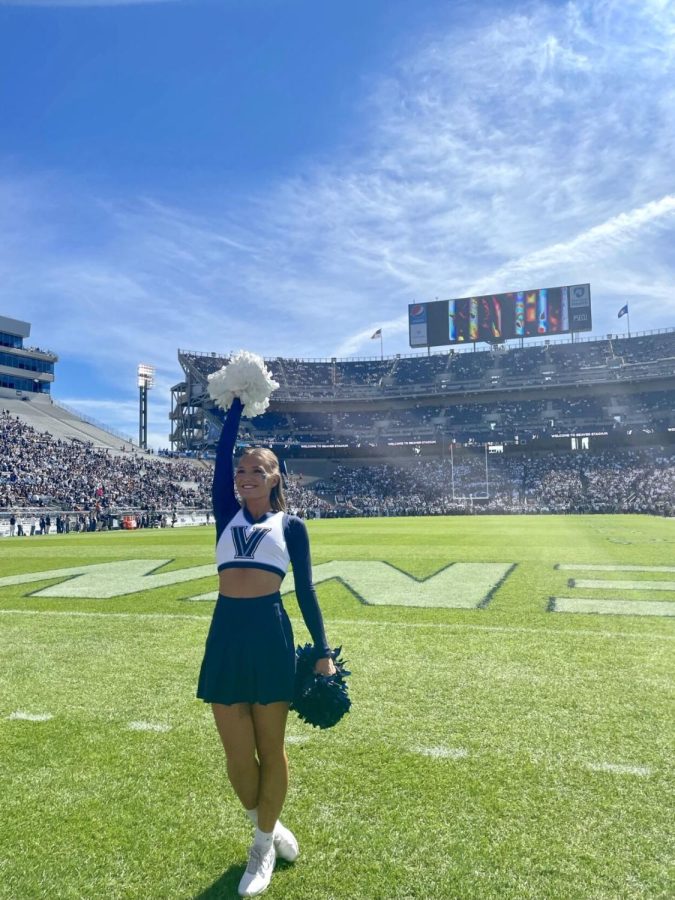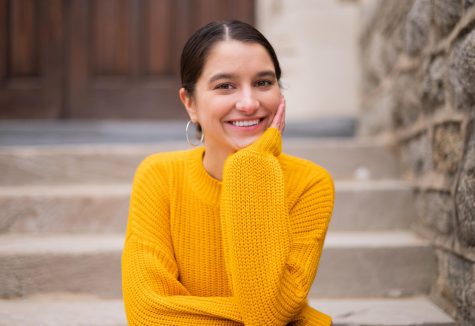Villanova Student Athletes Make Profit with New Law
Senior Nelya Naida is one of the student athletes utilizing the new NIL law.
November 17, 2021
Sponsorships and brand endorsements are no longer confined to the professional athletes, as a new rule passed this summer marked a transformation in the world of college athletics.
In July 2021, the NCAA announced the Name, Image and Likeness policy, or NIL, that allows student athletes across all divisions to make money or profit off of their athletic and celebrity status.
College athletes can now promote sponsored content on social media, garner endorsements and make money off of personal appearances.
With its Division One athletics, Villanova houses a multitude of athletes who jumped at the new opportunity to gain sponsorships and make a profit.
Junior golfer Matt Minerva is one of those athletes, having partnerships with companies since the age of fifteen.
“I’ve been a Titleist athlete since I was fifteen,” Minerva said. “I emailed a representative saying I love using their stuff after I qualified for the U.S. Junior Amateur.”
Once Minerva made contact, he secured a relationship with golf brand Titleist, which then sent him boxes of its merchandise for him to wear. Minerva had to stop the deal once he started playing golf for Villanova because of the regulations that prevented athletes from having profitable relationships with companies. However, the new NIL law presented Minerva, along with all other college athletes, that chance at a partnership again.
Minerva also works with the sports drink brand Lemon Perfect and is a college athlete for the sports and entertainment media company, Barstool Sports. Minerva’s job is to wear the free gear and use the products that these companies send to him, which he said is a help to him as much as it helps the brands being promoted.
In the same vein, senior cheerleader Nelya Naida became another Villanova athlete to contract a relationship with Barstool Sports. The sports media company was one of the first to jump on the new NIL law, creating a “Barstool Athletes” program to give selected college athletes media promotion and merchandise. Naida spoke about her experiences.
“Ever since I was accepted into the Barstool athlete pool, it has been really exciting knowing that I have an opportunity to build a name and brand for myself in the world of cheerleading and athletics,” Naida said. “I think it is great that Barstool Sports is providing this steppingstone for college athletes. However, I have noticed that in order to truly turn a profit requires a huge commitment to growing a social media presence.”
A strong social media presence is something that athletes like Stelios Kroudis, a senior lacrosse player, have utilized in light of the new law. Harboring more than 17,000 Instagram followers, Kroudis has been no stranger to the frontlines of the social media age. His popular YouTube channel about his athletic career attracted his large following, but it was not until the NIL law this summer that he was able to profit from his work.
“In the past, I was not able to make any money from YouTube ad revenue, paid promotions or work with brands that I love,” Kroudis said. “The most frustrating part of the NCAA restrictions before this year was the fact that non-student-athletes were able to do all of the things I can do now (and more) with no limitations at all. Now, I can use my online presence to build a brand that I always wanted to.”
Through his own personal marketing, to companies reaching out to him directly, Kroudis has established five partnerships, including Lax.com, Eat Clean Bro and the Lubrano Pain and Spine Treatment Center.
Kroudis does different promotional work for each. Lax.com is his YouTube channel sponsor.
“I am contracted with them to do different promotions and create content in exchange for payment, content and promotion on my YouTube Channel,” Kroudis said.
As for being a face for brands across all platforms, these athletes understand the responsibility of now representing beyond just the University.
Minerva spoke on how his perspective on sportsmanship is heightened even more so now.
“It just places a bigger emphasis on being respectful and understanding that people are going to support you,” Minerva said. “You need to be able to have etiquette and proper mannerisms if you’re struggling on the field or course or whatever you’re doing in order to stay positive. There is more to it than just the round you’re playing.”
As this change marks a cultural shift in the world of college athletics, potential challenges arise along with the opportunities for these already uber busy students.
“I think this change adds another level to being a student athlete as a whole because it creates a layer of social pressure,” Naida said. “In other words, student athletes will now have to balance maintaining a strong social media presence in order to make a profit in addition to their academics and busy practice and game schedules.”
Despite these potential time constraints, the opportunities of profit can have undoubted high rewards.
“With all of the priorities I have with school and lacrosse, I don’t have time to work a part time job or pull in a source of income,” Kroudis said. “Being able to make content and promote different brands allows me to make money in ways I would have never imagined.”













